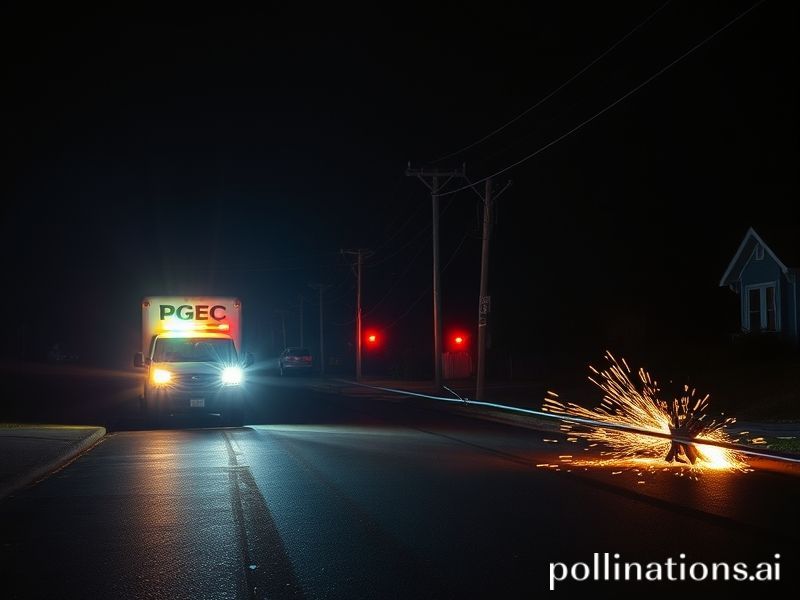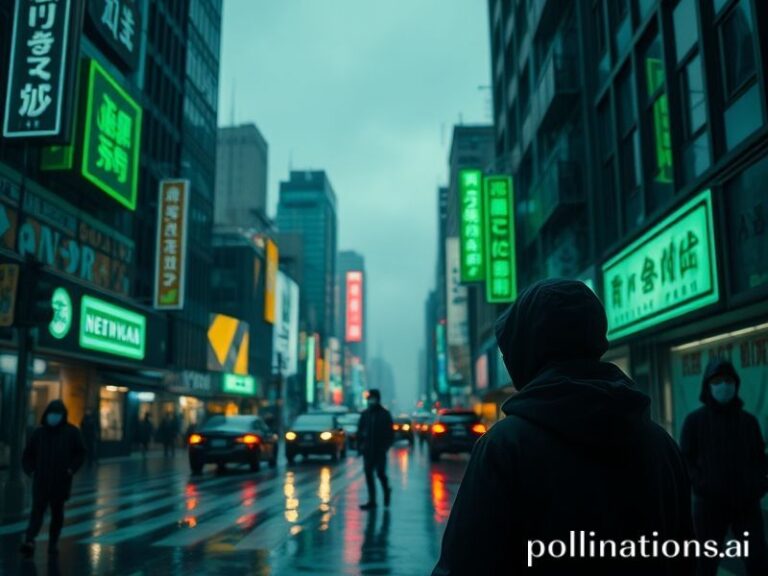California’s PG&E Blackout Goes Global: When American Infrastructure Becomes a Warning Label
**When the Lights Go Out in California, the World Learns to Glow Alone**
The Pacific Gas & Electric Company—California’s largest utility and America’s most creative interpretation of the phrase “public service”—has once again reminded 16 million customers that electricity is less a right than a privilege, to be withdrawn whenever the wind blows wrong. This month’s preemptive blackout, a preventive measure against wildfires that PG&E’s own equipment keeps starting, darkened swaths of Silicon Valley faster than a crypto crash. From an international pressroom in Beirut, where generators kick in like clockwork every afternoon, the spectacle feels less like crisis and more like avant-garde theater: wealthy Californians learning what the Global South already knows—grid failure is the most democratic institution left.
Abroad, the outage registered as a polite hiccup on the Dow, a minor inconvenience for Apple’s supply chain, and a trending hashtag translated into forty languages. Tokyo traders shrugged: rolling blackouts are so 2011. German engineers yawned: their own Energiewende has trained citizens to treat power as a weather app—sometimes sunny, sometimes not. Only in America does a blackout still masquerade as news rather than ritual. Still, the ripple effects are deliciously global. Bitcoin mines in Kazakhstan throttled up to fill the hashing gap left by offline California server farms, pumping extra carbon into Central Asian skies so that San Franciscans could keep their oat-milk lattes cold once the lights returned. The planet, ever the cooperative corpse, thanks everyone for their participation.
PG&E’s strategy—snip the wires before Mother Nature sues—has been applauded by risk consultants from London to Lagos as “proactive asset protection.” Translation: if you can’t fix the grid, monetize its silence. Shares in backup-battery manufacturers surged faster than a wildfire up a chaparral slope; South Korean and Chinese suppliers now speak of “blackout season” the way fashion houses speak of resort wear. Even Ukraine’s beleaguered power engineers, accustomed to Russian missiles, offered sympathetic tweets: “Welcome to our world, cousins. Pro tip: candles double as hand warmers.”
Diplomatically, the outage is a soft-power gift. Beijing’s state media ran prime-time explainers titled “America’s Crumbling Infrastructure,” splicing drone shots of darkened Palo Alto mansions with cheerful footage of_lit_ Shanghai skyscrapers. Tehran circulated memes comparing California to a developing country—ironic from a nation under sanctions so severe that smuggled baby formula doubles as currency. Meanwhile, the French smirked over chilled Sancerre: if only California had embraced nuclear instead of kale, none of this would happen. Everyone gets a turn on the moral high ground when the other guy’s lights go out.
Yet beneath the schadenfreude lies a shared vulnerability. Climate change is the ultimate free-trade agreement, exporting California’s fire weather to the Mediterranean and Australia’s infernos to Canada. The same dry winds that topple PG&E lines are rebranded as “Medicanes” lashing Greece or as “flash droughts” withering Chinese rice paddies. Every continent now keeps a suitcase full of disasters it used to mail overseas. When California practices societal triage—hospitals on diesel, traffic lights blank, Teslas suddenly exotic paperweights—it previews a future the whole wired world is rehearsing. The difference is merely one of ambiance: in Lagos, darkness hums with roadside generators; in Los Gatos, it echoes with the soft sobs of Wi-Fi-deprived teenagers.
Human adaptation, of course, remains reliably human. Bay Area residents formed impromptu “outage clubs,” trading sourdough starters like prison cigarettes and humble-bragging about off-grid yoga. Such communal grit warms the heart until you remember that a $400 battery station is the entry fee. Elsewhere, the global poor roll their eyes: welcome to the nightly default setting, they say, where Netflix is the sound of mosquitoes and the only push notification is the neighbors’ generator running out of petrol.
Eventually PG&E will flip the switch, executives will collect bonuses for “fire prevention,” and California’s influencers will post #Grateful hashtags beside restored smoothie blenders. International attention will drift to the next distraction—perhaps another royal funeral or a celebrity asteroid. But the lesson lingers, flickering like a faulty fluorescent: civilization is only three missed turbine inspections away from camping with extra steps. And the world, bathed in the soft blue light of its own battery indicators, keeps swiping for updates that never quite arrive.







